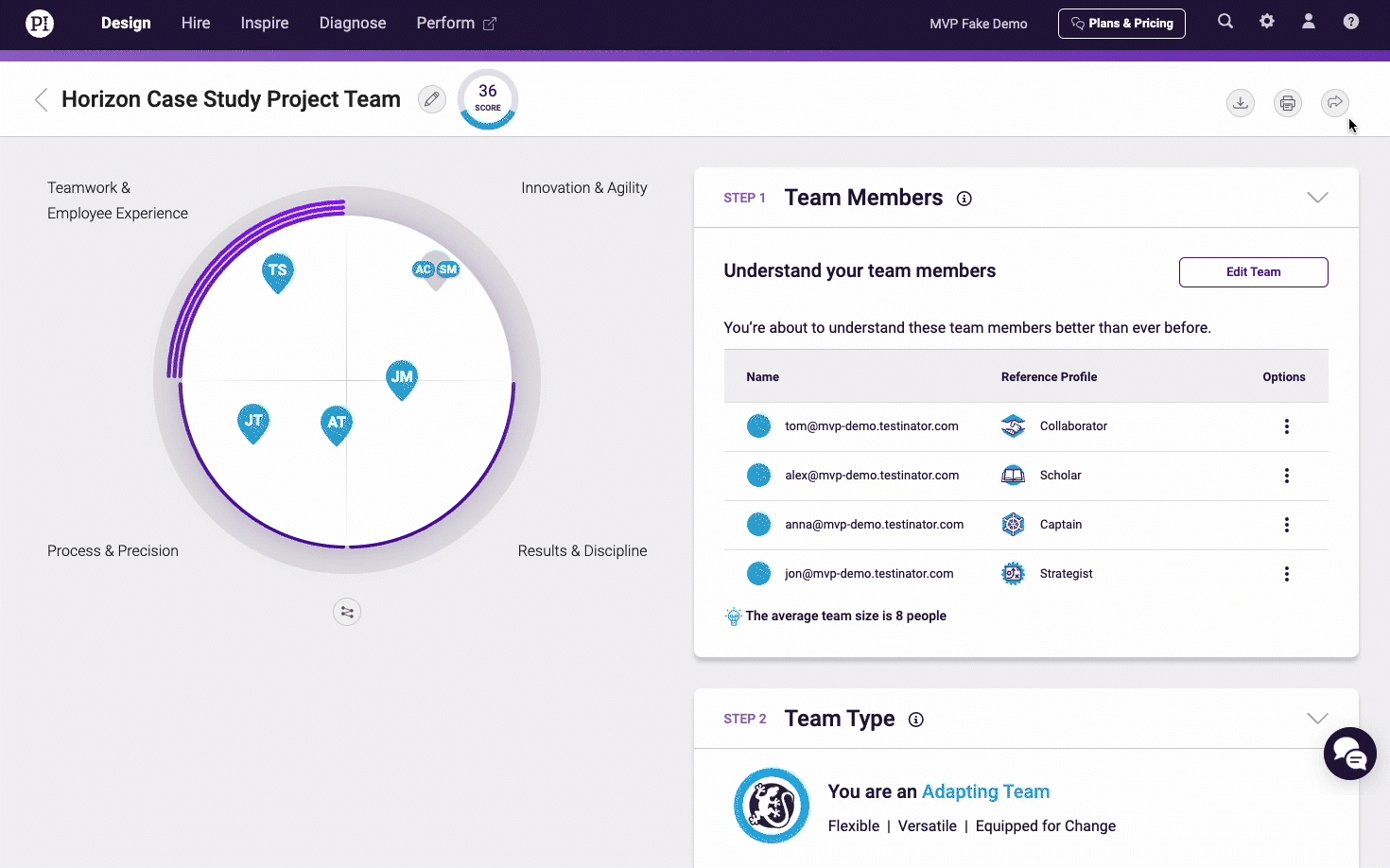Communication skills as a manager? Sure, you could say they’re important—in fact, some studies have found that more than three-quarters of employees blame workplace failures on poor communication and a lack of collaboration from their organization’s decision-makers.
Clearly, communication plays a critical role in organizational success. It’s why many in the field are now embracing communication training for managers—and developing essential leadership skills that help managers convey information, engage with their teams, and navigate sensitive interactions.
Below, we’ll take a closer look at communication training for managers:
- What communication training is and how it helps managers
- Why communication training matters for managers and their organizations
- How to improve communication skills through various training formats
- Key communication skills every manager should develop
As leaders in organizational development, The Predictive Index offers a wide array of resources—from certifications and courses to workshops and webinars—that equip managers with the tools they need to succeed.

Give your managers the tools to become outstanding leaders.
The best managers are developed and equipped with the right tools to help them grow—to navigate difficult conversations and support the growth of those around them. Strengthen your management and strengthen your business with PI for managers.
What is communication training?
Communication training for managers equips leaders with essential soft skills that enhance both verbal and nonverbal communication. This kind of training helps managers improve their ability to actively listen, resolve conflicts, and effectively convey ideas to their teams—ultimately driving organizational success as a result.
One common element of communication courses for managers involves helping participants identify their communication style. Common communication styles include assertive, aggressive, passive, passive-aggressive, and manipulative—all of which can cause certain blind spots or problems, depending on the context in which they’re expressed.
Understanding one’s approach—and the limitations that need attention—can help managers vastly improve their communication and the overall efficacy of their leadership.
Why communication training matters for managers
Effective communication training is vital for a manager’s professional development and has a significant impact on the overall success of the organization. Some important benefits include:
- Building better relationships with employees: Training enables managers to communicate more effectively with their teams, which strengthens relationships, boosts morale, and reduces turnover. When managers communicate clearly and consistently, it leads to building trust and engagement within their teams.
- Increasing employee engagement: Clear communication empowers employees to feel valued and heard. This leads to higher levels of engagement, which in turn enhances overall productivity and job satisfaction.
- Improving productivity and decision-making: Effective communication allows managers to make faster, more informed decisions. It also helps streamline team collaboration, ensuring efficient project management, which supports the growth of the organization.
- Reducing misunderstandings and conflict: Communication training helps managers develop active listening and conflict resolution skills. This can reduce workplace conflicts and misunderstandings, leading to a more harmonious and collaborative environment.
- Enhancing leadership presence: Managers who communicate effectively are seen as stronger leaders. This skill enables them to inspire and motivate their teams, leading by example and promoting a positive work culture.
- Boosting employee retention: When employees feel understood and valued by their managers, they are more likely to remain loyal to the company. Good communication helps managers address concerns early, reducing the likelihood of turnover.
How to improve communication skills as a manager
As you’ve seen, communication skills are a crucial part of effective management. Let’s explore some common formats of communication training programs, as well as some of the specific skills managers should focus on developing.
Common formats for communication training
Communication training courses for managers are typically offered in several formats, each with its own advantages:
- Online courses: These can be standalone or part of a series, with or without a certification. A main benefit here is flexibility, as online courses allow managers to learn at their own pace. They can range from introductory to advanced levels, depending on the needs of the manager.
- In-person courses: Conducted either externally or internally within an organization, in-person courses often provide immersive, hands-on training. Like online courses, they can be offered as one session or multiple sessions, with or without certification.
- Workshops: These are typically interactive and focus on developing specific communication skills. These events can be held in-person or online, featuring expert facilitators. They encourage active participation, allowing managers to practice communication techniques in real time and with other managers.
- Seminars: More formal than workshops, seminars focus on delivering practical information through expert-led presentations. These can also be hosted in person or online and tend to emphasize knowledge-building over interactive skill development. Seminars may help managers understand both effective and ineffective communication practices.

What are the most effective communication skills for managers?
Most communication training for managers focuses on soft skills, as previously mentioned. Let’s take a closer look at what those look like in a workplace setting:
- Verbal communication: Managers need to express ideas clearly and confidently. This includes public speaking, which demands clarity, transparency, and a confident delivery to ensure that everyone understands the message.
- Active listening: To foster an environment of trust and openness, managers must listen attentively to their teams. Active listening helps managers understand the needs, concerns, and feedback of their employees.
- Conflict resolution: This skill involves understanding both verbal and nonverbal cues, such as body language, to address and resolve disputes. Managers skilled in conflict resolution can maintain a harmonious work environment and keep the team focused on goals.
- Empathy: A key trait for any leader, empathy allows managers to understand and share the feelings of their team members. Empathetic managers build stronger relationships and create a supportive work culture.
- Motivation and influence: Managers who can communicate effectively are better able to motivate their teams, leading to higher engagement and better performance. They inspire others not only by what they say but also by how they say it.
- Giving and receiving feedback: Constructive feedback is essential for growth and improvement. Managers must be able to provide feedback that is clear, actionable, and respectful. They should also be open to receiving it from others to foster a culture of continuous learning.
How can leaders improve their communication skills?
Leaders can improve their essential communication skills by focusing on the following practices:
- Regular training and development: Leaders should participate in communication workshops, courses, or seminars to refine their skills. These can include both in-person and online formats, allowing flexibility and continuous learning.
- Practice active listening: Regularly engaging with team members and focusing on truly understanding their perspectives will help leaders become more empathetic communicators.
- Seek feedback: Leaders should encourage feedback from their teams about their communication style. This provides valuable insights into areas where improvement may be needed.
- Learn nonverbal communication cues: Understanding body language and other nonverbal signals can help leaders read situations better and respond more effectively.
- Model assertive communication: Leaders can practice being clear, direct, and respectful in their communications, setting an example for their teams to follow.
Improve communication skills with The Predictive Index
Improving communication skills is a must-have skill for managers who want to lead effectively and create a positive, productive team environment.
It’s why The Predictive Index offers resources that equip managers with the skills they need to handle tough conversations, build stronger relationships with their teams, and foster overall growth. Our solutions are designed to develop better leaders by providing them with the right tools to support not only their personal development but also the growth of those they manage.
By strengthening your managers, you strengthen your business. Give your managers the tools they need to become better communicators and leaders with PI for Managers.








